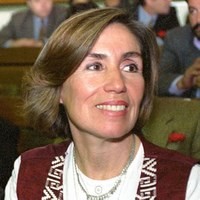Curepto, 1941 – Santiago (Chile), 2005
By Rodrigo Nobile
Gladys Marín Millie was a prominent communist leader in Chile, known for her tireless commitment to social justice, democratic values, and anti-dictatorship activism. She had a humble childhood, marked by the early loss of her father. Her family moved to Sarmiento and later to Talagante, where she studied and became actively involved in Christian youth movements, eventually becoming president of the Catholic Action. In 1958, she graduated as a teacher and joined the Communist Youth of Chile.
At the age of 22, Gladys Marín became a leader in the youth wing that supported Salvador Allende’s presidential campaign, which was defeated in 1959 by Eduardo Frei Montalva. During this period, she married fellow communist militant Jorge Muñoz Puteis, and they had two children. Marín was elected secretary of the Communist Youth and became deeply involved in Chile’s sociopolitical movements, such as the university reform movement and the formation of the Popular Action Front. She was also part of international movements, including the famous solidarity march with Vietnam, from Valparaíso to Santiago.
In 1965, she was elected as a congresswoman for a popular district in Santiago, and in the following elections, she was re-elected with a high vote. However, her second term was abruptly cut short on September 11, 1973, when the military coup ousted President Salvador Allende. Gladys Marín went into hiding, and later that year, at the request of the Communist Party of Chile (PCC), she sought asylum in the Dutch embassy, where she stayed for eight months, due to the denial of a safe-conduct pass. Her husband, Jorge Muñoz, was arrested in 1976, and he “disappeared” in the prison system under the Pinochet dictatorship.
During her exile, Marín fought for the democratization of Chile and denounced the crimes committed by Augusto Pinochet’s regime. She lived in Costa Rica and Moscow, and clandestinely returned to Chile in 1978. Once back, she became involved in rebuilding the organizational structure of the PCC and in the armed movement that was fighting for democracy. In 1994, after the end of the authoritarian regime, she was elected Secretary-General of the PCC, a position she held until her death on March 6, 2005.
In 1997, Gladys Marín ran for a Senate seat but was not elected, despite receiving significant support. Two years later, in 1999, she ran for the presidency of Chile, losing to Ricardo Lagos Escobar. In the later stages of her political career, she strongly criticized the neoliberal measures applied by successive governments of the Concertación of Parties for Democracy. She became a leading figure in the formation of the Junto PODEMOS – Poder Democrático Social pact, which denounced these policies and advocated for true democratization in the country.
One of her most memorable moments came when she was the main speaker at the protest marking the 30th anniversary of the military dictatorship, held in front of the La Moneda Palace. Unfortunately, shortly after this event, she was diagnosed with a brain tumor. She fought bravely against cancer, undergoing surgeries in Sweden and Cuba, where she was honored with the José Martí Order by Fidel Castro.
Gladys Marín’s death in 2005 was deeply mourned by thousands of militants, and her family and the Communist Party received messages of solidarity from activists and organizations around the world. Her legacy as a fierce advocate for social justice, democratic rights, and the fight against oppression remains an important chapter in the history of Chile and Latin America.



